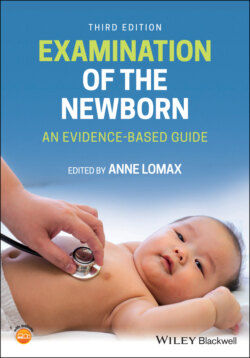Читать книгу Examination of the Newborn - Группа авторов - Страница 45
Interpretation of the information
ОглавлениеAside from the psychosocial skills of history taking, the ability of the examiner to interpret the information being given in a relevant way is just as significant. The history profile is only as good as the facts that are given and acknowledged as pertinent. The parents of the newborn may not recognise the significance of the questions being asked specific to family history. Some may be unaware of intergenerational traits within the family or of its significance to the newborn. Romitti (2007) commented on the accuracy of reporting family history by relatives. Interestingly, some mothers did not always disclose that they had a previous child with a birth defect; also the nature of the defect was not always accurately named. Socio‐demographic variables did influence the accuracy of detail given. However, factual details from the family are often confounded by their own understanding of the condition and their description of the condition or defect when medical terminology is not used. Indeed, they may not be clear on the exact position of the affected member in the family tree. It is not uncommon for a mother or father to contact other family members at the time of the newborn examination to obtain more information about conditions within the family.
TABLE 1.7 Common parental concerns at the newborn examination.
| Syndactyly |
| Polydactyly |
| Feeding issues, e.g. vomiting |
| Mild talipes previously undiagnosed on ultrasound scan |
| Tongue tie |
| Skin tags |
| Sinuses |
| Birthmarks |
| Pseudo‐menstruation |
| Moulding |
| Caput |
| Cephalohaematoma |
| Birth trauma markings |
| Intergenerational eczema, dermatitis and asthma |
| Intergeneration conditions and syndromes |
| Congenital abnormalities in first‐degree relatives |
As with many families who do have a positive trait for congenital anomalies or conditions, constructing the aetiology of the family from the environmental or genetic predisposition is often difficult. If a detailed family history is needed in the case of a positive intergenerational trait, then it may be desirable for the examination to be conducted by a senior paediatrician.
